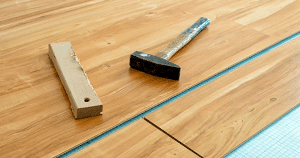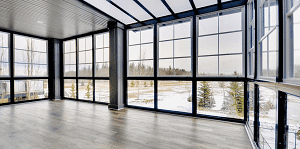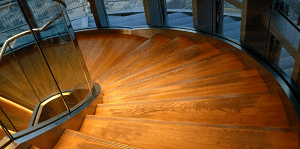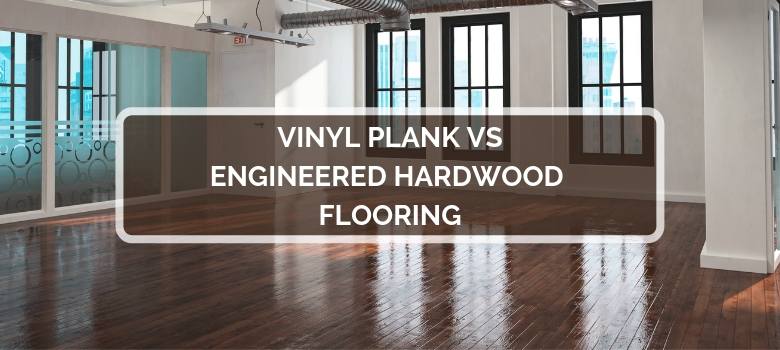Hardwood floors are expensive and prone to damage. However, you love the elegant look, which leads you to your current dilemma: how does luxury vinyl plank vs. engineered hardwood compare? Are these two flooring types comparable to hardwood? Or are they just not worth the hype?
In this guide, we’ll discuss the key differences between these two popular flooring options that homeowners are loving right now. We’ll compare engineered hardwood and luxury vinyl plank head-to-head in terms of durability, appearance, ease of maintenance, installation, cost, lifespan, and environmental impact. This will help you know the pros and cons of each to help you choose the best option for your home.

Side-by-Side Comparison
| Vinyl Plank | Engineered Hardwoods | |
|---|---|---|
| Durability | Extremely durable. Resistant to scratching. Can tear or dent. | Can be scratched or chipped. |
| Waterproof | Yes | More water resistant than hardwood flooring |
| Cleaning | Can be wet-mopped or steam-mopped. No waxes. | Can be cleaned with a damp mop or cloth with a cleaner designed for engineered hardwood |
| Maintenance | Replacement planks when needed | Can be refinished. Can be repaired with wood putty and stain. |
| Pet-Friendly | Yes | Yes |
| Styles | Multiple colors, finishes, and wood species such as oak and pine | Many colors, finishes, and wood species, including exotic hardwoods |
| Installation | Floating floor, peel-and-stick | Floating floor, glue-down, nail-down, staples |
| Lifespan | 5 to 20 years | 20 to 100 years |
| Good for Allergy Sufferers | Yes | Yes |
| Refinishing | No | Yes, for some products |
| Sustainability | Not biodegradable. Can release VOCs. | Recyclable. Some brands follow sustainable practices |
| Flooring Guide | Vinyl Plank Flooring Guide | Engineered Hardwood Flooring Guide |
Engineered Hardwood vs. LVP: Key Differences & Comparison Across 6 Factors
1. Durability
WINNER: When compared to engineered hardwood, luxury vinyl plank is the most durable. Even though there is the possibility that it will rip, its resistance to water and scratching makes it the ideal flooring for most households, even those with children and pets.
One of the big reasons that flooring like laminate, luxury vinyl plank, and engineered hardwood are becoming popular choices among consumers is that hardwoods look great, but they’re not easily replaceable.
Sure, hardwood can last for years. However, rowdy kids, pet claws running across the floor, and even moving furniture can result in scratches, dents, and other damage.
Luxury Vinyl Plank Durability
Vinyl plank is becoming extremely popular in households with children or pets, especially those with long nails. That is because it is so resistant to scratches and damage. Regular household traffic and even heavier traffic are no match for vinyl plank flooring.
Water Resistance of LVPs
LVP is the clear winner when it comes to water resistance. Many LVP products are completely water-resistant, so they can handle high-humidity spaces and frequent spills. When installed correctly, waterproof LVP prevents water from reaching the subfloor. It will not warp, buckle, stain, or become ruined like hardwood flooring.
This means that it can be installed in kitchens and below-grade rooms like basements or rooms that are humid and moist, like bathrooms or laundry rooms.
Durability Cons of LVPs
That said, luxury vinyl plank isn’t completely indestructible. Because it is made of soft vinyl, it can tear like other types of vinyl flooring. This typically occurs when something sharp or heavy is dropped or dragged over the flooring.
Vinyl plank can also dent under the weight of furniture and appliances. Low-cost coasters can be purchased to prevent this problem. Another problem is potential fading, but shades, blinds, and area rugs can prevent this problem in areas that are exposed to heavy sunlight.
Engineered Hardwood Durability
Engineered hardwood is different from solid hardwood because it is layered. While the top and bottom layers are crafted of real world, plywood layers are added in between. This makes the flooring more durable against moisture and humidity.
Because the top layer is real wood, engineered hardwood is susceptible to scratches just like traditional hardwoods. However, it is more resistant to dings, and some flooring brands use a finish that is more resistant to scratches. The benefit of engineered hardwood is that it can be refinished if the wear layer is thick enough (the wear layer typically ranges from 2mm to 10mm), which extends its lifespan. And since it excels in resisting dents and divots, it is ideal for holding up to heavy furniture and high-impact objects.
Water Resistance of Engineered Hardwood
Unlike traditional hardwoods, engineered hardwood can become wet but not as waterproof as LVP. But if you still want engineered hardwood flooring, choose brands that offer 100% waterproof options.
Durability Cons of Engineered Hardwood
While engineered hardwood offers better water resistance than solid hardwood due to its plywood core, it is not waterproof. High humidity or standing water can cause swelling or warping. This makes it less suitable for areas like bathrooms or laundry rooms. However, in dry environments, it performs well and provides an upscale finish.
Like vinyl and other types of flooring, engineered hardwoods can fade when exposed to heavy sunlight. To prevent this problem, you can use area rugs in areas exposed to sunlight. You can also use blinds, shades, or curtains on windows to block incoming sunlight.
Key Insight: Engineered hardwood floors are no more or less susceptible to scratches than solid hardwood. Floors made from harder woods like Hickory and Maple will scratch less easily than softer woods like Walnut or Cherry. Also, luxury vinyl floors can be sealed to be 100% waterproof, while engineered hardwood is better suited for rooms with stable humidity levels.
Helpful Tip: To reduce scratching on engineered hardwood floors, regularly sweep or vacuum to prevent debris like rocks from causing damage. Use rugs in high-traffic areas for additional protection.

Do You Need Help Finding a Durable Product With Great Value? Get In Touch!
Talk To A Floor Critics ProBack to Top
2. Styles & Colors
WINNER: Though vinyl plank has its share of colors and styles, engineered hardwood offers a much larger variety. If you prefer a natural look and feel, engineered hardwood wins. But if you want versatile and affordable alternatives with a similar appearance, LVP is the better option.
Everyone has different tastes when it comes to their home’s interior, so when choosing flooring, consumers want to have lots of options. How many choices will consumers have when purchasing vinyl plank or engineered hardwood?
Luxury Vinyl Plank Appearance
Vinyl plank flooring is available in many colors, from white and light gray to rich browns and ebony. This flooring is made using a printing process that replicates the look and even the feel of real hardwoods.
In fact, it does an excellent job of mimicking hardwood, especially high-quality options with deep embossing. It can simulate wood grain texture for a more realistic appearance. Advanced digital imaging also allows LVP to replicate distressed wood looks, including hand-scraping and nail holes. Thus, it can mimic the look of many species of wood, including oak and pine.
Engineered Hardwood Appearance
Engineered hardwood has the edge when it comes to aesthetics. With styles including rustic, classic, and modern, engineered hardwood provides many different options for consumers.
It is made with layers of real wood, including the visible layer, so it is available in many of the same shades as traditional hardwoods. It is also available in almost every species, from more common woods like oak, maple, and walnut to exotic species including tigerwood and African mahogany. Plus, it also offers the same underfoot feel as natural wood which provides unmatched authenticity.
Helpful Tip: Both options come in various finishes, wood species, and plank widths. While most engineered hardwood is pre-finished, unfinished options are available for custom finishing after installation.

Need Help Finding a Trusted Flooring Professional In Your Area?
Let Us Help You!
Get a Local Flooring ProBack to Top
3. Care & Maintenance
WINNER: Both types of flooring are fairly easy to clean and maintain. But because vinyl plank is maintenance-free and has no special considerations other than to use no-wax cleaners, it comes out on top for this round when compared to engineered hardwoods.
Beautiful floors look great, but often, consumers underestimate how much work it requires to keep flooring like hardwood looking its best. Do vinyl plank and engineered hardwood floors require as much upkeep, and how do they compare to each other?
Luxury Vinyl Plank Maintenance
LVP is slightly easier to maintain compared to engineered hardwood. It can be swept, vacuumed, and wet-mopped without issue.
Vinyl flooring is one of the easiest floors to care for and maintain. Since it is completely water-resistant, it can get wet, which means that you can use a wet mop or a steam mop, unlike other types of flooring like hardwoods.
You can clean vinyl plank daily using a broom, dust mop, or vacuum cleaner meant for hard floor use. When it’s very dirty, sticky, or dusty, you can do heavier cleaning with a steam mop using just water or a mop with white vinegar and water or a mild cleaner.
Never use cleaners with wax or wax polishes on vinyl floors. That will put a buildup on the flooring you will need to strip. If the flooring seems to lose its shine, you can apply no-wax polishes made for use on vinyl floors.
You do not need to do virtually any maintenance to keep vinyl floors looking their best. Use furniture coasters to prevent dents and scratches. You should not expose the floors for prolonged periods to sunlight. That can cause fading.
If vinyl planks become damaged, you will need to replace the entire plank. Luckily, this isn’t a very difficult job, and most people can tackle it themselves. You cannot sand or refinish vinyl floors, and you will need to replace old, damaged floors.
Engineered Hardwood Maintenance
Engineered hardwood is also easy to maintain, but it requires a more cautious approach when mopping (minimal water use is advised).
You will need to take special care when cleaning engineered hardwood floors. However, they are much easier to clean than traditional hardwoods.
For regular cleaning, you can sweep the floor with a broom, dust mop, or vacuum it with a vacuum cleaner for use on bare floors. When you need to do heavier cleaning, you can use a damp cloth or mop with a cleaner made for engineered hardwood flooring.
You can repair engineered hardwood flooring using wood putty and stain. Depending on the thickness of the top layer of wood, you may refinish engineered hardwoods in the future if you need to. However, you should follow all manufacturer’s specifications and instructions to ensure that you can refinish the floor.
Helpful Tip: If unsure about a cleaning product, test it in an inconspicuous area first to avoid damage. Always follow the manufacturer’s instructions when using cleaning agents. Avoid using abrasive scrubbers or floor wax.

Back to Top
4. Installation
WINNER: Because it doesn’t require many tools and just a little know-how, vinyl plank surpasses engineered hardwoods when it comes to ease of installation.
Consumers on a budget not only need to consider the overall price of flooring but the cost of installation as well. In some cases, paying a professional to install flooring can cost more than the flooring itself – not ideal for anyone who has a tight budget.
This is why so many consumers opt to tackle the projects themselves. With so many video tutorials and step-by-step instructions online, some flooring can be easy to install, but others just aren’t worth the hassle. How do vinyl plank and engineered hardwoods stack up when it comes to ease of installation?
Luxury Vinyl Plank Installation
LVP is easier to install than engineered hardwood with two different ways to install them:
- Floating Floor Installation
The first way is by installing it as a floating floor with snap-together click-lock planks. This installation method works with vinyl plank that has a tongue and groove design, allowing each plank to click together.
When aligned properly, the planks fit together tightly and you do not need to glue or nail them to the floor. This installation is similar to laminate and requires very few tools. You can complete the job using just a measuring tape and a utility knife to cut planks to size, making it a popular choice for DIY installations.
- Peel-and-Stick Installation
The other way to install vinyl flooring is to simply stick them to the floor. This can only be done with peel-and-stick planks, which have a paper backing. You can remove the paper backing to reveal adhesive.
Then, align the planks and simply stick them to the prepared subfloor. As with a floating floor, you can complete this job using just a utility knife for cutting and a measuring tape. Peel-and-stick planks are one of the easiest types of flooring to install, even for DIY newbies.
Engineered Hardwood Installation
Traditional engineered hardwood requires more effort, as it often uses a tongue-and-groove system and needs to be nailed or glued down. This increases both the difficulty level and installation time. While click-lock versions exist for floating floors which doesn’t require adhesives or nails, they are generally limited to thinner-profile engineered hardwood.
Other methods for the installation of engineered hardwoods are nail-down floors and glue-down floors (floors that you staple to the subfloor are also available):
- Floating: A DIY-friendly method using a click system without nails or glue.
- Glue down: Ideal for high-traffic areas requiring superior adherence.
- Nail down: Provides superior stability but requires professional expertise.
These require a bit more work, as well as more tools and supplies including but not limited to staple guns, a drill and drill bits, and a table saw.
Putting down engineered hardwood isn’t completely impossible, but it is more of a challenge, especially for consumers who opt not to choose a floating floor. You will need to purchase underlayment and put it on the subfloor before starting installation, adding more work and an extra expense.
Important Note: Both LVP and engineered hardwood should acclimate to the room’s environment for at least 48 hours before installation to avoid warping or shrinking, which can cause gaps between planks.
Helpful Tip: Luxury vinyl planks are known for being easy to install, making them a great option for DIY enthusiasts. Engineered hardwood, while more challenging, ensures professional longevity when properly installed.

Do You Need Help Finding a Durable Product With Great Value? Get In Touch!
Talk To A Floor Critics ProBack to Top
5. Cost
WINNER: Luxury vinyl is the more affordable flooring option when compared to engineered hardwood floors. Homeowners can keep the costs even lower if they choose to complete the installation themselves.
Flooring can get expensive, as any consumer who has visited their local home improvement store already knows. In addition to considering the price of the flooring, additional materials, tools, and installation can add thousands of dollars to the cost.
Luxury Vinyl Plank Cost
On average, consumers should expect to pay between $1 and $5 per square foot for vinyl plank, which is extremely affordable. Higher-end LVP with added durability and realism can cost up to $10 per square foot.
Moreover, vinyl plank installation costs generally run about $4 to $7 per square foot, although many homeowners choose to tackle the task themselves which eliminates labor costs
Engineered Hardwood Cost
The average cost of engineered hardwood flooring is about $8 per square foot and can range from $4 to $10 per square foot, depending on the flooring selected. Professional installation typically adds another $3 to $10 per square foot, increasing the total cost. Despite the higher upfront expense, engineered hardwood can be a long-term investment due to its extended lifespan.
Helpful Tip: While higher price points often reflect better performance and longevity, spending less on either material may result in a lower resale value.

Need Help Finding a Trusted Flooring Professional In Your Area?
Let Us Help You!
Get a Local Flooring ProBack to Top
6. Lifespan
WINNER: When it comes to which has the longer lifespan, engineered hardwoods are the clear winner. This flooring can easily retain its beauty for many, many decades, from one generation to the next. (NOTE: Its longevity depends on the care it receives.)
Installing new flooring is a big task and expense, so it only makes sense that homeowners want a floor that will last. Between vinyl plank and engineered hardwoods, which flooring stands the test of time?
Luxury Vinyl Plank Lifespan
LVP has a shorter lifespan compared to engineered hardwood because it cannot be refinished. On average, vinyl flooring should last for 20 years or longer. However, if you select a thinner vinyl, you may need to replace this flooring after just 5 to 10 years.
(NOTE: Heavy furniture can cause dents and dragging objects may tear the planks which will affect the flooring’s lifespan.)
Engineered Hardwood Lifespan
On the other hand, engineered hardwoods are built to last. They last longer than LVP due to their ability to be refinished.
This flooring will last for a minimum of 20 years with proper cleaning and maintenance. Since the hardwood wear layer ranges from 2mm to 10mm, you can refinish thicker layers multiple times.
In some cases, hardwood flooring can last up to 100 years or even longer. Of course, the amount of wear and tear through the life of the flooring, as well as how well you care for it and maintain it, may affect this timeline.
7. Environmental Impact
WINNER: While luxury vinyl planks have improved in sustainability with recyclable products and reduced VOC emissions, engineered wood remains the more eco-friendly option overall.
Luxury Vinyl Plank Sustainability
LVP is made from PVC (polyvinyl chloride), a synthetic material that is not biodegradable. While it can be durable and long-lasting, it has a higher environmental impact compared to natural materials. Moreover, the production process can emit volatile organic compounds (VOCs) which are hazardous.
Engineered Hardwood Sustainability
Engineered hardwood is a more sustainable choice because it uses less solid wood than traditional hardwood flooring. The plywood core often comes from fast-growing trees and many manufacturers adhere to eco-friendly practices, such as FSC (Forest Stewardship Council) certification. You can also recycle it, unlike LVP.
Helpful Tip: If sustainability is among your priorities, look for engineered hardwood brands that source wood responsibly and use low-VOC finishes for better indoor air quality.
FAQ
Although luxury vinyl plank and engineered vinyl plank are extremely similar, one difference will help you differentiate these two flooring materials. EVP has a core layer that is more rigid and thicker than the core of LVP. The wear layer of EV planks is also thicker to withstand high traffic without noting signs of wear and damage.
Luxury vinyl planks have a flexible core, are thinner, and therefore are less durable and more prone to damage. If you opt for EVP when buying floors you can expect them to last longer than LVP and be better heat and sound insulators.
Is LVP or EVP better?
In general, luxury vinyl plank and engineered vinyl plank are two very similar materials. As we mentioned, the main difference between the two is that EVP is made of a higher quality core, which makes it more durable, and the wear layer is more rigid and thicker. Therefore, it’s safe to say that EVP is a slightly better alternative than LVP.
In terms of maintenance, both types of vinyl planks are easy to care for. In addition, both come in a variety of colors, shades, finishes, and styles, so you’ll find it straightforward to pick one for your home.
Is engineered wood better than LVT?
Luxury vinyl tiles are a form of vinyl flooring that comes packed in the form of tiles. Engineered wood and LVT are two different flooring types, both of which are pretty durable and come in various colors and styles. Engineered wood is even more durable than LVR; it can increase the value of your home and can be refinished and repaired.
Luxury vinyl tiles are more resistant to scratches and damage; however, they won’t increase your home’s value. If one of the tiles does get damaged, it’s straightforward to replace them and the floor will look as good as new. In addition, most LVTs are waterproof.
Final Verdict
Engineered Hardwood vs Luxury Vinyl Plank Flooring: Final Verdict
Both vinyl plank flooring and engineered hardwoods have their benefits and drawbacks. Anyone looking for low-maintenance, budget-friendly flooring and wanting one that’s extremely durable and easy to install will be pleased with all that vinyl plank has to offer.
On the other hand, if someone is looking for long-lasting flooring that’s lower-maintenance than traditional hardwoods and comes in a variety of colors and wood species, they can’t go wrong with the purchase of engineered hardwoods.
Both flooring types are great alternatives to traditional hardwood flooring. Before making the purchase, you just need to evaluate what you want in your flooring, how long you want it to last, and what you’re willing to spend for your next home improvement project.

Back to Top Back to Top
